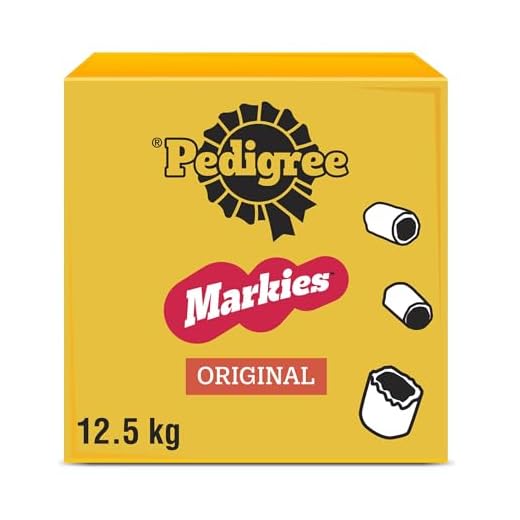








Choosing marrow as a treat for your furry companion is a decision rooted in their natural instincts. The rich, nutrient-dense core found within long bones is not just a tasty indulgence; it serves as an excellent source of protein and fat. This combination provides energy and supports healthy skin and coat, making it an attractive option for many pet owners.
When I first introduced my own pet to this delicacy, the reaction was immediate and enthusiastic. The sheer delight on their face was a clear indication of its appeal. The act of chewing on these robust pieces not only satisfies their innate need to gnaw but also helps maintain dental health by reducing plaque buildup. It’s a win-win situation, where enjoyment meets health benefits.
Many pet owners may wonder about safety. It’s essential to choose raw or properly cooked marrow, avoiding those that splinter easily. Supervised chewing sessions can further ensure a safe experience. Observing my dog thoroughly enjoying this treat, I realised it was not just about the taste; it was also an engaging activity that kept them occupied and mentally stimulated.
Incorporating marrow into your pet’s diet can be a delightful experience. However, moderation is key, as too much can lead to digestive issues. Balancing this indulgence with a nutritious overall diet is crucial for maintaining their well-being. My exploration of this treat has not only enriched my pet’s life but has also deepened our bond through shared moments of joy during treat time.
The Nutritional Benefits of Bone Marrow for Dogs
Including this nutrient-rich substance in your pet’s diet can significantly enhance their health. It is packed with healthy fats, proteins, and essential vitamins that support energy levels and overall well-being.
One of the standout features of this delicacy is its high collagen content. Collagen aids joint health, promoting mobility and reducing the risk of arthritis in older companions. Regular consumption can contribute to stronger joints and improved flexibility.
Additionally, the presence of minerals such as calcium and phosphorus plays a crucial role in maintaining strong bones and teeth. These minerals ensure that your furry friend has the necessary nutrients to sustain a robust skeletal structure.
The fatty acids found within this treat can promote a shiny coat and healthy skin. If you’ve ever noticed your pet’s fur looking dull, incorporating this source into their diet may help restore its lustre.
Moreover, the gelatin derived from this substance can aid digestive health. It helps to soothe the gut lining and can be beneficial for those with sensitive stomachs. This can lead to better nutrient absorption and improved overall gut function.
When considering portion sizes, moderation is key. A small piece a few times a week can provide these benefits without leading to excessive calorie intake. Always consult with a veterinarian to tailor dietary choices to your companion’s individual needs.
How Bone Marrow Affects a Dog’s Dental Health
Incorporating this treat into a canine’s diet can significantly improve oral hygiene. Chewing on these nutrient-rich items helps remove plaque and tartar buildup, promoting fresher breath and healthier gums. The natural abrasion from gnawing assists in cleaning teeth effectively, reducing the risk of dental diseases.
Veterinarians often recommend these treats as part of a comprehensive dental care plan. Regular chewing can strengthen jaw muscles and stimulate saliva production, which plays a crucial role in neutralising harmful bacteria in the mouth. Saliva also helps wash away food particles, creating a cleaner oral environment.
Pay attention to the size and type of these delicacies you offer. Opt for larger pieces to discourage choking hazards and ensure they are appropriate for your pet’s chewing habits. Always supervise while they indulge to prevent any mishaps.
Be mindful of how much you give, as excessive consumption could lead to digestive issues. A balanced approach is key, especially if your furry friend tends to get bored with their meals. For further insights on maintaining a diverse diet, check out why does my dog get bored of his food.
Incorporating this type of treat thoughtfully can lead to noticeable improvements in oral health, ensuring your companion stays happy and healthy for years to come.
The Role of Smell in a Dog’s Attraction to Bone Marrow
The olfactory system of canines is extraordinarily developed, allowing them to detect scents at levels we can hardly imagine. When it comes to the rich, savoury aroma of marrow-filled bones, their interest is piqued almost instantly. The unique combination of fats and proteins released during cooking enhances the scent, making it even more appealing to them.
The aroma triggers their instinctual drive to seek out food high in nutrients. Smell receptors in a canine’s nose are vastly more numerous than in humans, increasing their ability to identify specific scents related to potential food sources. This natural inclination drives them to investigate anything that emits a strong fragrance, particularly those related to protein sources.
<p.In my experience, when I crack open a marrow bone for my furry companion, the excitement is palpable. The moment the scent wafts through the air, he’s immediately drawn in, tail wagging and eyes wide. It’s not just about hunger; it’s a primal response that connects him to his ancestors who relied on these nutrient-rich resources for survival.
<p.The scent of marrow not only signals deliciousness but also safety and nourishment. This is why offering such treats can be very rewarding for them. Each time they get a whiff of that enticing aroma, it reinforces their connection to the food source, making them more eager to enjoy it.
<p.When selecting marrow bones, consider the cooking method as well. Roasting bones typically brings out a more intense scent compared to raw options. Experimenting with different preparation styles can enhance your pet's experience and keep them engaged.
<p.A strong scent not only draws them in but also keeps them occupied. The longer it takes them to gnaw at the marrow, the more satisfaction they derive from the activity. This can lead to improved mental stimulation, which is beneficial for their overall well-being.
Safe Ways to Serve Bone Marrow to Your Dog
Start with raw or freshly cooked pieces. Avoid processed options as they may contain additives harmful to pets. Here are some methods to safely serve this treat:
Preparation Techniques
- Roasting: Place marrow bones in the oven at a low temperature for about 20-30 minutes. This enhances flavour without overcooking.
- Freezing: Freeze marrow-filled bones for a cooling treat, especially in warm weather. This can also help with teething for younger canines.
- Soups: Use marrow to enrich homemade soups or broths. Ensure all ingredients are safe for consumption.
Serving Guidelines
- Monitor portion sizes. A small piece is sufficient to prevent any digestive issues.
- Always supervise while enjoying this delicacy to avoid choking hazards.
- Introduce gradually to assess tolerance. Start with small amounts to gauge reactions.
- Remove the bone after a short period to prevent excessive chewing, which can lead to dental damage.
After serving, keep an eye on any potential allergies or digestive upset. Consulting a vet for tailored advice is always a good idea. Enjoy these moments with your furry friend, knowing that you’re providing a treat they truly appreciate!
Understanding the Risks of Feeding Bone Marrow
Feeding the inner part of bones can pose specific hazards that every pet owner should be aware of. While the allure of these treats is undeniable, safety must be prioritised to prevent potential health issues.
Choking Hazards
Large pieces of bone can create choking risks, especially if they splinter. It’s crucial to supervise your canine companion while they enjoy these treats and ensure that the pieces are an appropriate size for their breed. Always opt for larger bones that are less likely to be swallowed whole.
Digestive Issues
Introducing rich substances into your pet’s diet can lead to gastrointestinal disturbances. Symptoms like diarrhoea or vomiting may occur if the animal consumes too much at once. Moderation is key. Start with small amounts to gauge how their system reacts.
| Potential Risks | Symptoms | Recommendations |
|---|---|---|
| Choking | Coughing, gagging | Supervise and cut into smaller pieces |
| Digestive Upset | Diarrhoea, vomiting | Introduce gradually, monitor reactions |
| Dental Damage | Broken teeth, gum injuries | Choose softer options, avoid hard bones |
Pay close attention to any changes in behaviour or health after consumption. If any adverse symptoms arise, consult a veterinarian promptly. Keeping these factors in mind will help ensure a safe and enjoyable experience for your furry friend.
Alternatives to Bone Marrow for Canine Enjoyment
Consider including raw vegetables such as carrots or sweet potatoes in your pet’s diet. These options are not only crunchy but also rich in vitamins and minerals, making them a healthy alternative. They can keep your furry friend engaged while providing essential nutrients without the potential risks associated with certain types of animal products.
Chews and Treats
Natural chews, like bully sticks or dehydrated fish skins, can serve as excellent substitutes. They offer a satisfying texture and can help maintain oral hygiene by reducing plaque build-up. Always opt for high-quality brands to ensure safety and nutritional value.
Homemade Delights
Preparing treats at home can be rewarding. Consider baking pumpkin or peanut butter biscuits. These ingredients are generally safe and appealing, providing a tasty snack without the risks of raw bones. Just ensure you avoid additives like xylitol, which is harmful to pets.
Incorporating these alternatives can enrich your companion’s diet while keeping their taste buds happy. Always monitor their reactions to new foods and adjust accordingly for optimal health and enjoyment.









